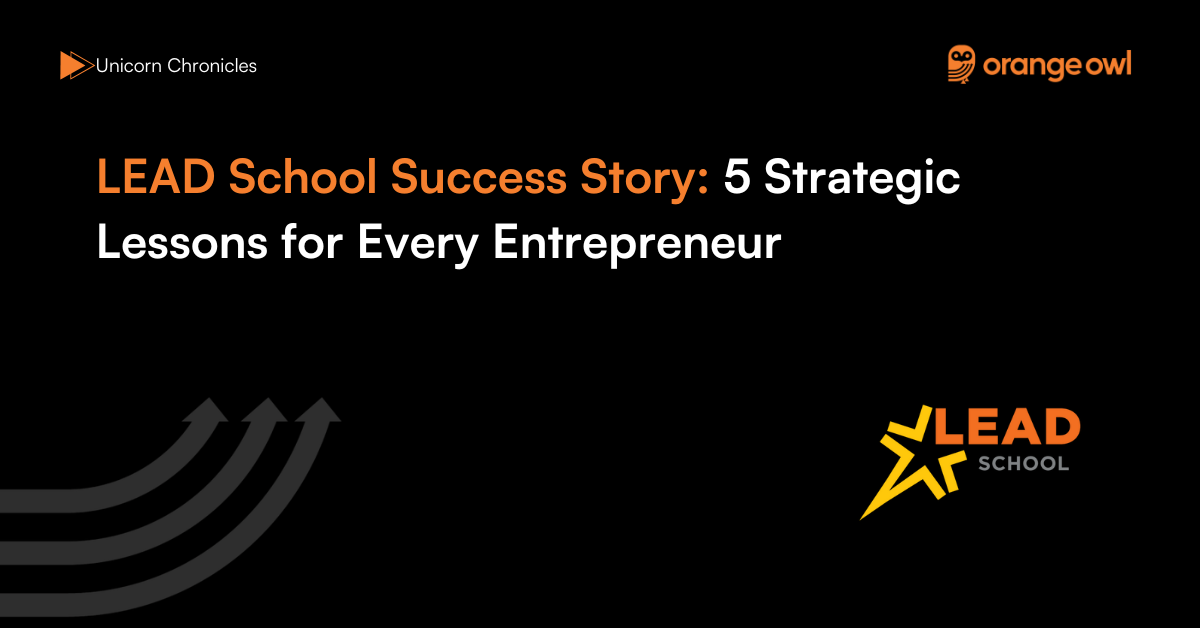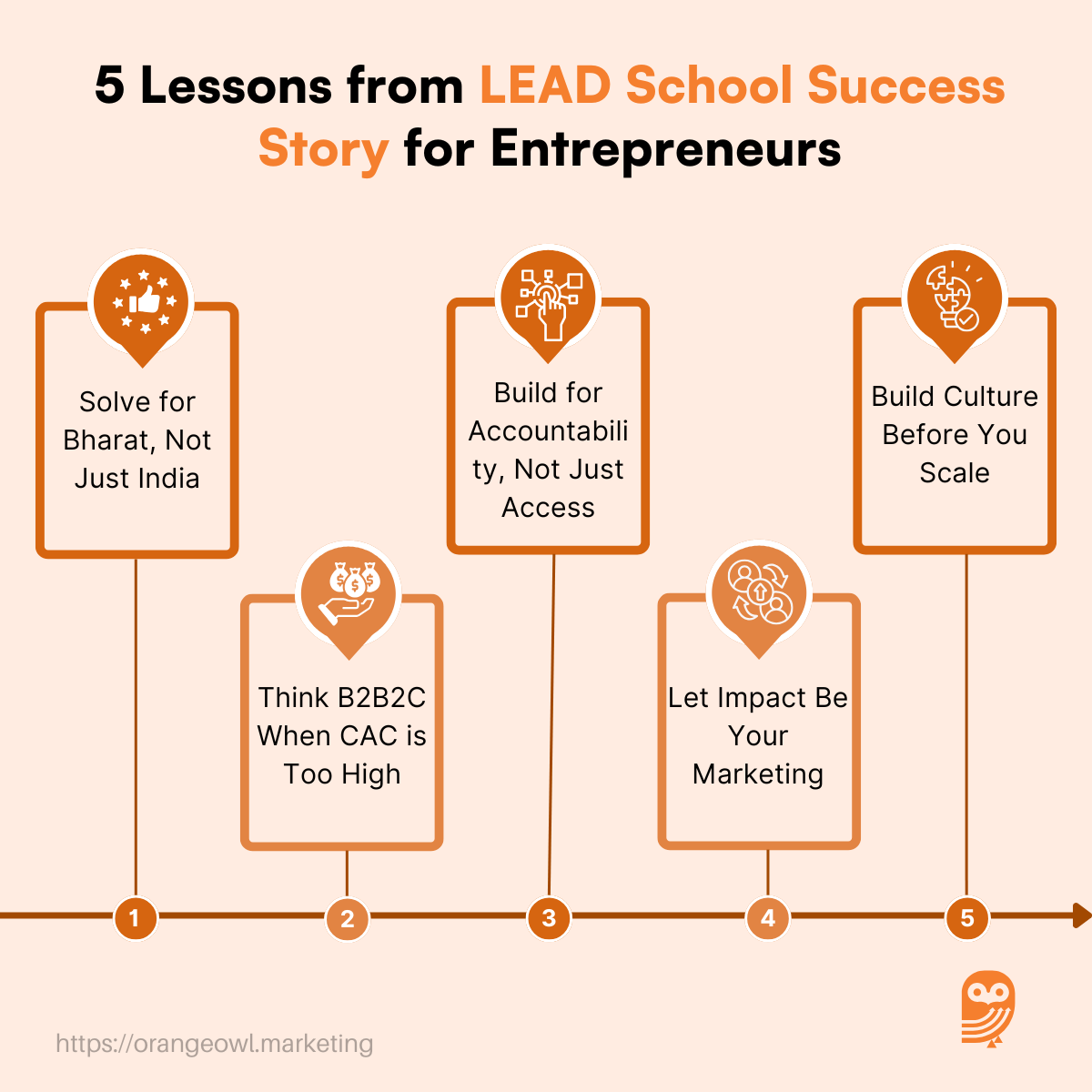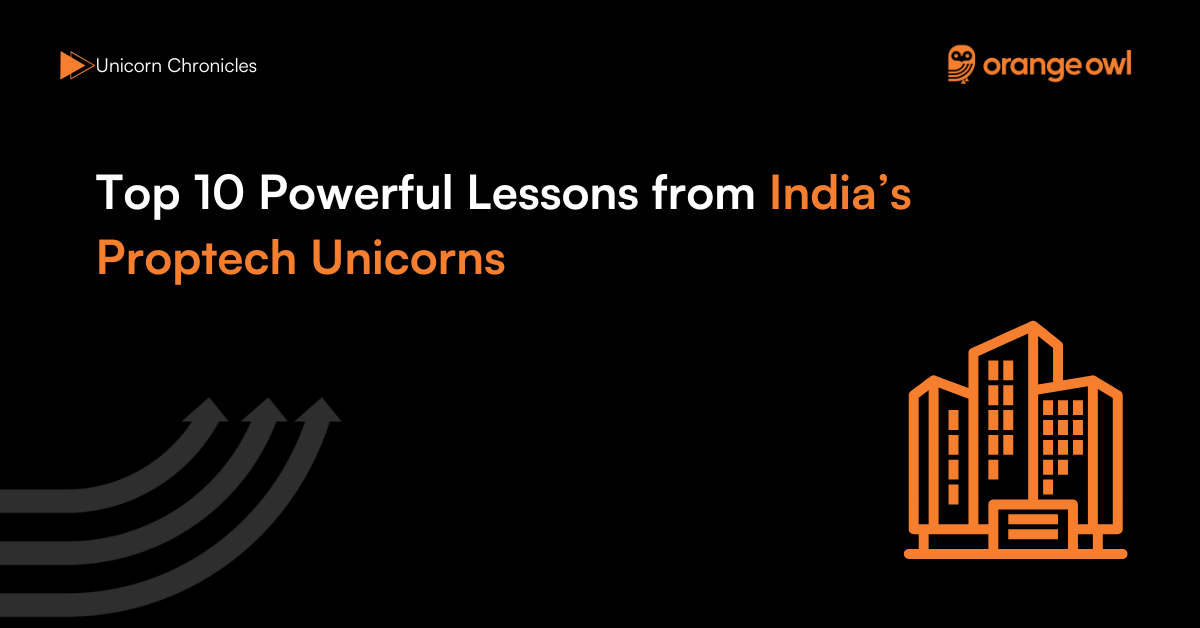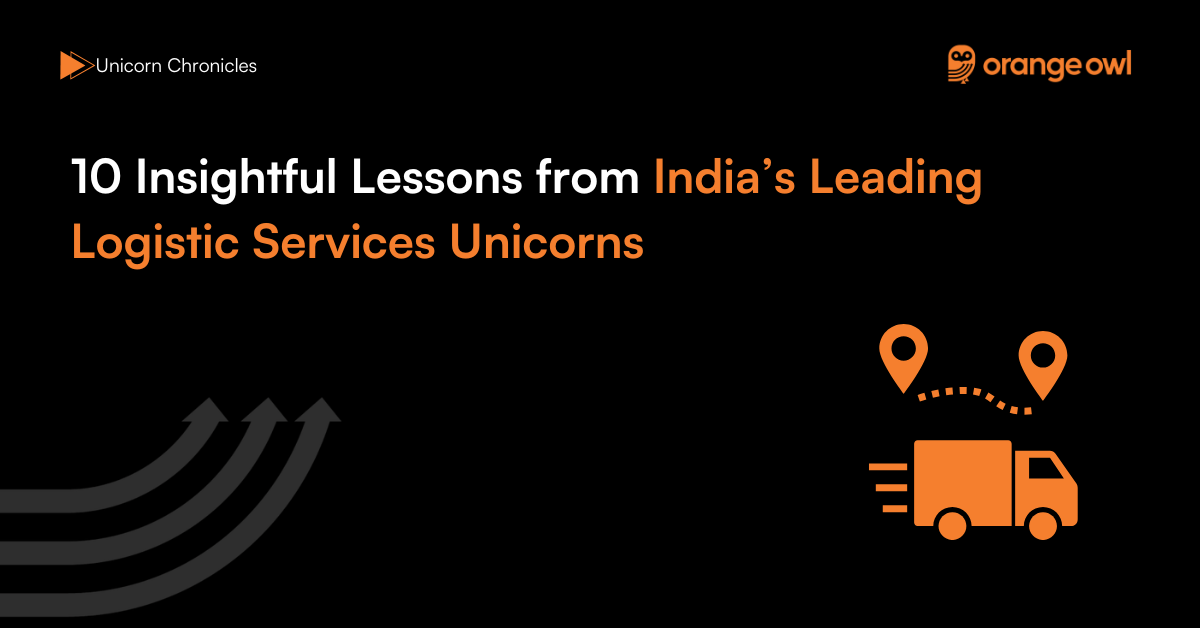LEAD School Success Story: 5 Strategic Lessons for Every Entrepreneur
Vivek Goel
June 17, 2025

Table of Contents
Introduction
In India’s dynamic edtech ecosystem, LEAD School has emerged as a trailblazer in transforming K-12 education through technology-integrated learning. Founded in 2012 by Sumeet Mehta and Smita Deorah, LEAD was envisioned as a comprehensive solution to bridge the quality gap in school education across India. What began as a small chain of affordable schools soon evolved into a full-stack edtech platform that empowers teachers, enhances student outcomes, and drives systemic change in the education system.
The LEAD School success story is a compelling case of mission-driven entrepreneurship meeting disciplined execution. By January 2022, LEAD entered India’s unicorn club with a $100 million Series E round led by WestBridge Capital and GSV Ventures, reaching a valuation of $1.1 billion (₹9,070 crore). The company has raised a total of $172 million to date from marquee investors like Elevar Equity, firmly positioning itself as a category-defining player in the K-12 edtech space.
Headquartered in Mumbai, LEAD currently operates across B2C, B2B, SaaS, and social impact segments, offering a suite of digital tools for schools, including curriculum resources, assessments, teacher training, and student management systems. Its platform enables seamless in-school and at-home learning, designed to support educators through both digital and in-person training programs.
Despite facing competition from over 650 edtech companies globally, including Amplify, EVERFI, and Eupheus Learning, LEAD has carved a unique niche by combining affordability with academic excellence. With a vision to reach 25 million students in the coming years, the company continues to scale with purpose, proving that sustainable impact in education is not just aspirational—it’s achievable.
The LEAD School’s success story is not just about unicorn status or capital raised. It stands as a testament to how a bold vision, relentless focus on outcomes, and deep understanding of ground realities can reimagine education for millions of children across India.
Origin Story
LEAD School’s journey began not in a boardroom or on a digital whiteboard, but in the classrooms of rural Gujarat. In 2012, co-founders Sumeet Mehta and Smita Deorah were driven by a singular, urgent question: Why are millions of children in India going to school but not truly learning?
Sumeet, a former CEO at Zee Learn, had spent years understanding the systemic cracks in India’s school education. Smita, an educationist with a finance background, had seen firsthand the gap between curriculum design and actual classroom delivery. Together, they launched LEAD not as an edtech product, but as a network of affordable schools to test and validate their pedagogy.
“We started by running our own schools, so we could go deep into the problem. That’s where we built the foundation of our integrated system,” — Sumeet Mehta
What they discovered was a deeply fragmented ecosystem. Teachers lacked training, students struggled to retain concepts, and schools operated without visibility into learning outcomes. This real-world immersion helped the duo design the core of what would later become the LEAD Integrated System—a full-stack solution combining curriculum, assessments, teacher development, and school management into one seamless digital platform.
By 2017, the company pivoted from running schools to empowering existing schools across India with its tech-enabled academic system. “We realised the real scale and impact would come not from owning a few schools, but by enabling thousands,” said Smita.
This transition was both bold and strategic. Instead of chasing the crowded after-school tutoring market, LEAD embedded itself within the core infrastructure of education—the classroom. The approach paid off. In just a few years, LEAD expanded to serve thousands of affordable private schools across India, reaching students who had previously been left behind by both public and elite private systems.
“Our mission was clear: deliver guaranteed learning outcomes, not just access to digital content. That’s what made LEAD different from the start,” — Smita Deorah
What began as an experiment in one district has evolved into one of India’s most ambitious education reform stories. LEAD School’s origin is rooted in first-principles thinking, fieldwork, and a refusal to accept that quality education is only for the privileged few.
Business Landscape and Early Challenges
Founded in 2012, LEAD School set out to address one of the most persistent challenges in India’s education system: the learning crisis in budget private schools. While more than 120 million students attend private schools across India, a large majority lack access to quality content, trained teachers, and basic infrastructure—factors that directly impact learning outcomes.
Co-founders Sumeet Mehta and Smita Deorah saw this problem not from a distance, but up close. After operating their own schools in rural Gujarat, they recognised that fragmented pedagogy, untrained teachers, and a lack of real-time academic visibility were limiting student progress in Tier 2, Tier 3, and rural India.
“We realised that if children aren’t learning despite being in school, then something is fundamentally broken. Our mission was to guarantee learning outcomes, not just digital access,” — Sumeet Mehta
Rather than enter the crowded after-school tutoring market, LEAD positioned itself at the core of the learning process, within the school system itself. It developed a full-stack platform combining curriculum, digital tools, teacher training, assessments, and analytics, offered as an integrated solution to private schools. This B2B2C model was unique in a sector dominated by direct-to-consumer edtech players.
But building for schools, not just students, came with its own set of challenges.
Many school owners were wary of digital transformation, often lacking the resources or technical know-how to implement it. Convincing educators to adopt new teaching methods—especially in non-urban settings—required ground-level training, continuous support, and, above all, trust.
“It wasn’t just about selling software. We had to win hearts, show impact, and walk with our partner schools every step of the way,” — Smita Deorah
Moreover, LEAD had to build an entire ecosystem from scratch, not just a product. That meant creating high-quality curriculum content aligned with national standards, designing intuitive tech interfaces for teachers and students, setting up feedback loops, and offering 24/7 support to partner schools.
The edtech boom during the pandemic gave LEAD a window of accelerated adoption, especially as schools sought continuity in teaching. By January 2022, LEAD raised $100 million in a Series E round led by WestBridge Capital and GSV Ventures, earning unicorn status at a valuation of $1.1 billion.
As of 2024, the company is valued at ₹9,070 crore (~$1.1B), serving thousands of schools across India and actively expanding into deeper rural and semi-urban regions.
LEAD School’s success lies in solving a hard, often overlooked problem—not just digitising education, but fixing classroom delivery at scale. Its journey is a testament to first-principle thinking, operational rigour, and an unwavering belief that every child, regardless of geography or income, deserves an excellent education.
Growth Strategies
LEAD School’s growth strategy is rooted in solving a deep-rooted problem in Indian education: how to deliver quality learning outcomes in affordable private schools. Instead of chasing scale via test prep or consumer marketing, LEAD built a full-stack B2B2C platform designed to transform how schools teach and operate.
From day one, LEAD chose to empower schools rather than bypass them. Its integrated solution combines curriculum, teacher training, assessments, and school management tools into one seamless system. This allows partner schools to improve both academic outcomes and operational efficiency.
“We were never interested in vanity metrics. Our growth has always been outcome-driven—if the child learns better, the school grows, and so do we.”
— Sumeet Mehta, Co-founder, LEAD School
LEAD’s core growth engine is its school-partner model, where every school becomes a long-term customer receiving ongoing academic support, teacher training, and performance insights. This model has led to high retention rates, especially in Tier 2 and Tier 3 cities.
By focusing on “visible learning outcomes,” LEAD has gained the trust of educators and parents alike—something most edtech startups struggle to achieve. Its ground-level GTM approach—with local sales teams and onboarding tools—has enabled rapid adoption, even in under-digitised regions.
The pandemic accelerated LEAD’s relevance, as its hybrid-ready model helped thousands of schools maintain learning continuity and transition to live digital classrooms.
By 2022, LEAD became a unicorn with a $1.1 billion valuation and continues to grow steadily, now valued at ₹9,070 crore. Rather than expand horizontally, the company deepens its platform with real-time assessments, LMS tools, and digital report cards, making itself indispensable to schools.
“We’re not just digitising education—we’re fixing the broken engine inside classrooms.”
— Smita Deorah, Co-founder, LEAD School
Today, LEAD serves over 9,000 schools and aims to reach 25 million students, proving that mission-first, outcomes-led growth can build a sustainable and scalable edtech ecosystem for India.
Marketing Strategies
The LEAD School success story is a testament to how purpose-driven marketing rooted in impact and trust can create deep brand equity, especially in a sector as sensitive as K-12 education. Unlike many edtech players that chase visibility through celebrity endorsements or broad media campaigns, LEAD School focused on a far more effective proposition: proof of learning outcomes.
“Our goal was never to create hype. It was to build trust with schools by proving we could improve student outcomes—quickly and sustainably,” said co-founder Sumeet Mehta.
LEAD School’s approach prioritised school administrators, teachers, and owners as its core audience, instead of targeting students or parents directly. This B2B2C strategy ensured that marketing conversations were rooted in pedagogical outcomes, not just features. Its most powerful marketing asset? Success stories from real schools that adopted the LEAD platform and witnessed a 70% improvement in learning outcomes within just one academic year.
These schools became brand advocates, sharing their transformation journeys through webinars, case studies, and education summits. Word-of-mouth grew rapidly, especially across Tier 2 and Tier 3 cities, where personal referrals and community trust outweigh digital noise.
Rather than investing in national TV ads, LEAD School doubled down on hyperlocal activation. On-ground teams conducted live demos, teacher bootcamps, and impact workshops, creating immediate, firsthand exposure to the platform’s value. This grassroots engagement built a deep moat around LEAD’s customer base—hard to replicate and immensely sticky.
On the digital front, LEAD maintained a targeted presence on platforms like LinkedIn, YouTube, and Facebook, where it shared principal testimonials, before-and-after metrics, and teacher training insights. Every piece of content reinforced a consistent message: LEAD School enables schools to deliver world-class education affordably and at scale.
“We wanted to empower schools to say: ‘We’re not just running a school—we’re transforming lives,’” said co-founder Smita Deorah.
In parallel, LEAD invested in thought leadership—organising panels, publishing whitepapers, and contributing to education policy conversations. These efforts established it as a credible voice in India’s school transformation journey, not just a product vendor.
Interestingly, while parents weren’t the primary target, they were indirectly reached through parent dashboards, performance updates, and school communications powered by the LEAD platform. As parents witnessed their children’s academic growth firsthand, the platform’s household credibility soared.
The brand’s consistent campaign messaging—like “Empowering Every School, Every Teacher, Every Child”—reinforced its mission to make quality education accessible to every student in India.
As Smita Deorah puts it:
“Our product is our best advertisement. When children learn better, everyone notices.”
This commitment to authenticity, measurable impact, and grassroots trust-building defines the marketing engine behind the LEAD School success story. Not built on noise, but on the quiet power of results.
5 Growth Lessons for Every Entrepreneur
1. Solve for Bharat, Not Just India
LEAD School didn’t begin with elite private institutions in metros—it started by partnering with low-fee budget private schools in Tier 2 and Tier 3 towns, where learning outcomes were most broken. The product wasn’t flashy, but it was deeply impactful. These schools lacked structured curricula, teacher training, and digital access—LEAD provided it all in one integrated solution.
“We didn’t want to serve the top 5%. We wanted to fix education for the other 95%.”
— Sumeet Mehta, Co-founder, LEAD School
Entrepreneurial takeaway: Real scale often lies beyond urban markets. Build solutions for underserved India, and the growth will follow.
2. Think B2B2C When CAC is Too High
Rather than chasing parents and students with expensive marketing, LEAD School cracked a smarter distribution model: sell directly to schools. With each school signed, LEAD got access to hundreds of students, low CAC, and high LTV. And by proving real learning outcomes, they turned schools into brand evangelists.
“When one school improved scores by 70%, ten others called us the next month.”
— Smita Deorah, Co-founder, LEAD School
Entrepreneurial takeaway: If your target customer is expensive to acquire, find the gatekeeper who already has their trust.

3. Build for Accountability, Not Just Access
In a world flooded with edtech apps and videos, LEAD School differentiated itself by owning the full academic experience. From lesson plans and training teachers to real-time assessments and parent dashboards, they built for accountability at every level.
This full-stack model ensured consistent quality, not just access. And it worked. Schools started seeing visible improvement in student performance, and they stayed.
“You can’t fix learning by just adding content. You have to change how schools operate.” — Sumeet Mehta
Entrepreneurial takeaway: Access is only the start. To truly solve a problem, own the end-to-end journey.
4. Let Impact Be Your Marketing
LEAD School didn’t run flashy ads or chase celebrity influencers. Instead, they let measurable learning outcomes drive the narrative. Improved student scores, happier teachers, and better-performing schools became the strongest marketing engine.
Through school-led testimonials, impact webinars, and word-of-mouth referrals, they built organic, trust-based growth, especially in smaller towns where reputation is everything.
“Our product is our best marketing. When children learn better, everyone notices.”
— Smita Deorah
Entrepreneurial takeaway: If your product delivers real, visible results, let it speak for itself.
5. Build Culture Before You Scale
As LEAD grew rapidly—from a few schools to thousands—it stayed grounded in its mission: every child deserves an excellent education, regardless of income or location. Internally, the team prioritised teacher empathy, school-level obsession, and data-backed decision-making.
Even after achieving unicorn status in 2022, the founders kept reinforcing a culture of purpose-driven growth.
“We hire people who care about kids, not just scale.”
— Sumeet Mehta
Entrepreneurial takeaway: A strong culture isn’t optional—it’s the foundation for sustainable scale.
Conclusion
LEAD School isn’t just a unicorn—it’s a transformation blueprint for India’s school education. What began as a small intervention in rural Gujarat evolved into a nationwide movement to ensure every child receives quality learning, regardless of geography or income.
“We’re not building an edtech company—we’re rebuilding the school system from the ground up.”
— Sumeet Mehta, Co-founder, LEAD School
What sets LEAD apart is its full-stack approach, combining curriculum, technology, assessments, teacher training, and parent engagement into one seamless platform. In a space where access often overshadows outcomes, LEAD made measurable learning gains its core metric.
Instead of chasing hyper-growth through direct-to-consumer models, LEAD partnered with schools, empowered teachers, and earned trust the hard way—through results. It focused on Bharat before India, proving that real innovation happens when you solve for the grassroots.
Even as it reached unicorn status in 2022, LEAD never strayed from its mission. As education evolves in a post-pandemic world, LEAD is leading the charge—blending digital tools with on-ground accountability to redefine how foundational learning is delivered in India.
LEAD School’s journey isn’t just a case study in scaling—it’s a lesson in staying grounded, being mission-first, and proving that when impact is the goal, growth is the outcome.


